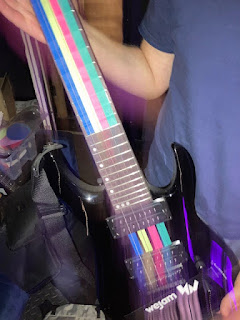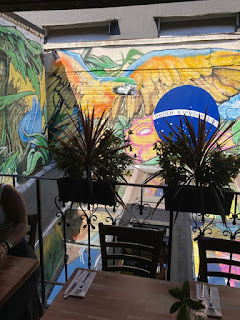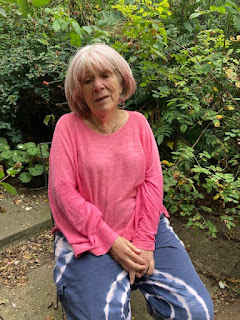My World Café.
My book has 28 chapters. There were supposed to be 29, but on legal advice, ‘Rainbow Trout’, was removed. Here is a redacted version to make it impossible to trace the person I am writing about and to allow you to see the wonderful drawings Laura Davis made to accompany this story. I think it was the most political of all the chapters since it sums up the limits of our ‘democracy’. After reading this you can purchase the book here.
Rainbow Trout
To taste right, fish must swim three times – in water, in butter and in wine. Proverb
Rainbow trout, or Oncorhynchus mykiss, was given its name by 18th Century German naturalist, Johann Walbaum, and was based on fish found in the rivers of the Kamchatka Peninsula in Siberia. The genus name is from the Greek onkos, hook and rynchos, nose – a reference to the hooked jaws of mating season males. Common to rivers and lakes in the North Pacific, they were introduced to the UK in the early 20th Century. They can weigh as much as 14 kilos.
My childhood years in London were a time of post-war food rationing, but there was never a shortage of fish. During the war, sea fishing had been restricted and, after years of recovery, our coastal seas had plentiful shoals. There were cod, mackerel, skate, haddock, plaice and eels. I would go with my mother every Thursday to the fishmonger. On Saturdays I would accompany her to buy live eels, netted from a large metal tank. My father loved them, but my favourite was the mackerel which my mother cooked in butter and salt.
Nothing was wasted. After the fish were fried, grilled or baked, fish pie followed the next day with any leftover vegetables. Once a week we had breakfast kippers, smoked herring served with poached eggs on toast. I always looked forward to it as a break from the daily fry-ups.
My first memory of eating fish outside the home was when, aged seven, my father took me to a fish-and-chip shop in Bromley High Street. I was fascinated by the gurgling oil vats and loved the smell of sizzling fish. He ordered battered cod for us both, the chips wrapped in a page from the Daily Mirror, paper cones sprinkled with salt and dribbled with vinegar.
Eating cod and chips will have been common to many readers of my generation, but few would have eaten other sea fish such as salmon, halibut, Dover and lemon sole. In the 50s, these were rarities, which only made it into the mouths of the well-to-do.
This was also true of freshwater fish. While researching this chapter, I discovered that in England and Wales there are 40,000 miles of rivers, but less than 4% have public access. The person who owns the riverbank also owns the fishing rights.
As a member of the well-to-do middle class, I was sent to Canford Public School in Dorset. For American readers, ‘public’ equals private. There I fished on the River Stour which ran through the school grounds. My favourite spot was below the weir. Using a spinner, I caught pike, roach and the occasional brown trout. I can still see in my mind the eight-pound trout which the school chef cooked for me, and which I shared with my friends. It was a rare break from the weekly fishcakes.
Many years later, I was working in the former Yugoslavia. I fished for fresh water trout on the River Krka, north of Šibenik, and, while holidaying on the island of Krk, sea trout. When I was living in Mostar, my friends and I would visit Blagaj, on the River Buna. There is a fish farm there with its own restaurant serving fresh trout. It was one of my greatest epicurean pleasures to sit close to the source of the river, gushing out 200 metres below the sheer cliff above. Close by is a Dervish monastery, known as a tekija.
I had a very different trout experience when visiting New Mexico with Anne. Before leaving Taos in the northern part of the state for her home-town of Las Cruces, she bought a Native American drum with a buffalo painted on its skin. We set off on the road south and stopped to eat at a restaurant beside the Rio Grande. There I ate rainbow trout for the first time. In its cooked state, it reminded me of salmon; its texture was firm and meaty, if you’ll pardon the expression. After our meal, Anne climbed the hill behind the restaurant and pounded her new drum. Far below us, there was a group of kayakers. They stopped paddling, looked up, waved and hollered at us.
The next time I ate trout was a more serious experience, that lacked the spirit and joy of eating beside those two rivers. I was helping to organise medical programmes in Croatia and Bosnia, when I received a call from the House of Lords. It was Lord Trout – a pseudonym – inviting me to lunch. He said he wanted my advice on a medical project. This was not an invitation I was eager to accept. I had no desire to be hosted by an aristocrat in the unelected chamber of Parliament, the last bastion of Britain’s feudal past. But when he said he was an involved in Kosovo, as an advisor to hospitals, how could I refuse?
Before I left for the lunch, I checked out Lord Trout’s background. The family’s large estate is located on the banks of a river with some of the best fishing in the country. During our meal, I was looking for the opportunity to tell him my fishing joke.
Before our meeting, I hadn’t looked up how to address him. Was it, Your Lordlship, Your Grace, Your Honour? I went for the option of calling him nothing at all. Arriving at the entry to the House of Lords, I said that I was a guest of Lord Trout. I was quickly taken past the long queue of those waiting for a tour of the building and escorted to the Peers’ Dining Room. I was handed over to the maître d’ who took me to a table by a window overlooking the Thames. He pulled out a blue leather chair, its backrest embossed with the House of Lords’ emblem.
“What can I get you to drink while you wait for his Lordship?” “I’ll have a beer, please. A lager.” I looked up at a large portrait of a steely Lord Palmerston, glower- ing down at the diners. I felt he was looking at me with a ‘What in hell’s name are you doing here?’ I remembered Shelley’s words about his fellow Ulsterman and political mentor in The Masque of Anarchy:
I met Murder on the way –
He had a mask like Castlereagh –
Very smooth he looked, yet grim;
Seven blood-hounds followed him
“I’m sorry I am late. Debate in the chamber. Have you ordered a drink?” I stood up and shook Lord Trout’s hand. “Let’s order our food, and then I can tell you why I invited you here.
What would you like to start with?” I scanned the menu. “Baked ham hock with pickled shallots for the starter, please. For the main, I’ll go for the rainbow trout.” “Wise choice. The fish here are very good. I’ll join you.”I looked at the prices. A greasy spoon breakfast at a Holloway Road cafe cost more. “Very cheap”, I said. “Subsidised, of course", was his Lordship’s reply Of course. The waiter came to take our orders.“Ham hock and trout for my friend. For me turtle soup and trout.” Then Lord Trout looked at me. “Head?” “Sorry?” “Do you want the chef to leave its head on?”“Off, please.”
He handed the menus to the waiter. “No head for my friend. Leave mine on.”I then asked him how I could help him with his work. “I was told your charity supply diabetic medicines for children in Bosnia. I have been asked to advise on setting up a maternity unit in a town in Kosovo. I need to know how many beds will be needed.”
“I’m afraid I have no idea, but I suspect a ratio will help you.”“A ratio?” “Based on the town’s population.”"That’s very interesting,” he said and opened his notebook to start writing. “You could contact the British Medical Journal or The Lancet and check if they have any information.” He continued scribbling, “Very interesting, thank you.” “Or you could contact the World Health Organisation.” He nodded. “Of course.” I asked if he had been to Kosovo. He hadn’t. “You could ask them how they managed before the war.” “Very interesting. Thank you so much.” He scribbled a bit more, then closed his notebook.
The trout, when it arrived, was perfectly cooked. Brushed with oil, grilled whole with bone-in and stuffed with sliced lemon and herb sprigs. The skin was crisp, the flesh moist and flaky. It was served with red cabbage and sour cream. “Coffee on the terrace?” his Lordship asked. Before leaving, we exchanged pleasantries, and I wanted to tell him my joke, but decided it was best that I didn’t. But here it is for you.
A farmworker was caught by a gamekeeper fishing on the river that ran through the grounds of the local landowner. Hauled before the landowner, he was told that he was trespassing. “Why, is it your land?” asked the farmworker. “It’s been in my family for generations, from the time of my great-great-great grandfather,” replied the Lord. “How did he get it?” asked the farmworker. “He fought for it.” The farmworker raised his fists. “Well then, let’s fight.”
I don’t eat much fish today. In this country, fish stocks are increasingly contaminated by mercury, dioxins, pesticides, raw sewage and micro-plastics. Trout remains a memory of a privileged childhood and a fixture in a House of Privilege. On my way out from the Lords, I passed a line of wheelchairs with name tags of their owners on each one: Lord W, Lady X, Earl Y, Bishop Z. Hopefully the Lords, both spiritual and temporal, are on their last legs.
Ingredients
4 rainbow trout
4 lemons, sliced into halves
2 limes, sliced into quarters
800g red cabbage,finely shredded
12 asparagus
olive oil
4 tbs butter
2 glasses dry white wine garlic
4 tbs chopped parsley salt and pepper
Method
Slice each fish along the backbone. Place the cabbage and oil in a saucepan, sprinkle with salt and cook for five minutes. Meanwhile, place the asparagus in an oven dish and coat with salt, pepper and a squeeze of lime juice. Cook for 15 minutes. Place sliced lemons and limes inside each fish, add garlic slices and cook in butter for 2 minutes on each side. Place the cabbage on each plate, and top with the fish. Add the oven-roasted asparagus set to one side. Serve with new potatoes.



















.jpg)




.jpg)







